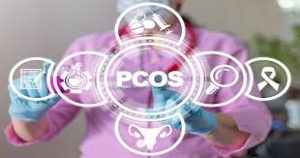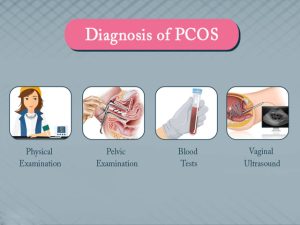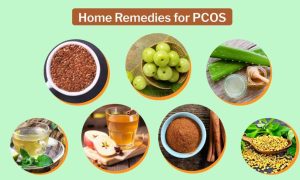
Understanding the Diagnostic Journey
Navigating Symptoms and Medical History
Polycystic Ovary Syndrome (PCOS) is a complex condition with no single test for diagnosis. Healthcare providers initiate the diagnostic process by delving into a patient’s symptoms, medications, and medical history. A detailed discussion about menstrual cycles, weight changes, and a comprehensive physical exam is conducted, encompassing an assessment for excess hair growth, insulin resistance, and acne.

Diagnostic Tools Unveiled
- Pelvic Exam: A cornerstone in the diagnostic arsenal, this examination allows healthcare providers to scrutinize reproductive organs for masses, growths, or any discernible changes.
- Blood Tests: Hormone levels are meticulously measured to pinpoint imbalances. These tests help exclude other potential causes of menstrual irregularities or androgen excess mimicking PCOS. Additionally, fasting cholesterol and triglyceride levels are examined, along with a glucose tolerance test to assess the body’s response to sugar.
- Ultrasound: A transvaginal ultrasound provides a visual examination of the ovaries’ appearance and the thickness of the uterine lining. This non-invasive procedure utilizes sound waves emitted by a transducer placed in the vagina, translating into images on a computer screen.
Peering into PCOS Complications
For individuals diagnosed with PCOS, the healthcare journey may extend to additional tests for ongoing monitoring. Regular checks encompass blood pressure, glucose tolerance, cholesterol, and triglyceride levels. Screenings for depression, anxiety, and obstructive sleep apnea may also be recommended to ensure a comprehensive understanding of the patient’s health status.

Tailoring Treatment for PCOS
Holistic Approaches
PCOS treatment is not a one-size-fits-all solution; it’s a tailored approach focusing on specific concerns such as infertility, hirsutism, acne, or obesity.
Lifestyle Changes
Healthcare providers often advocate for lifestyle modifications as a foundational step. Recommendations may include weight loss through a combination of a low-calorie diet and moderate exercise. Even a modest weight reduction, such as 5% of body weight, can yield significant improvements. Collaborative efforts with a healthcare provider and a registered dietitian are essential in formulating an effective weight-loss plan.

Medications: A Multifaceted Approach
- Regulating Menstrual Periods: Options include combination birth control pills or progestin therapy, both of which contribute to hormonal balance and mitigate symptoms like irregular bleeding, excess hair growth, and acne.
- Fertility Enhancement: Medications like Clomiphene, Letrozole, Metformin, and Gonadotropins may be recommended to induce ovulation and enhance the chances of conception.
- Managing Excessive Hair Growth or Acne: Birth control pills, Spironolactone, Eflornithine, and various hair removal methods are suggested to address cosmetic concerns associated with PCOS.
Exploring Procedures for Pregnancy
For those facing challenges in natural conception, assisted reproductive technologies such as in vitro fertilization may be considered under the guidance of healthcare professionals.

Lifestyle and Home Remedies: A Proactive Approach
To complement medical interventions, individuals with PCOS are encouraged to adopt lifestyle and home remedies that can positively impact their well-being.
- Maintaining a Healthy Weight: Weight loss is highlighted as a pivotal strategy to lower insulin and androgen levels, potentially restoring regular ovulation. Healthcare providers may recommend weight-control programs, if needed.
- Carbohydrate Management: Considering the potential impact of high-carbohydrate diets on insulin levels, individuals with PCOS are advised to limit carbohydrate intake. Embracing complex carbohydrates found in fruits, vegetables, whole grains, and legumes can be beneficial.
- Embracing Physical Activity: Regular exercise is touted as a potent tool to lower blood sugar levels, treat insulin resistance, and manage weight. It may also contribute to the prevention of diabetes.

Preparation for Medical Consultation
Individuals seeking medical advice for PCOS can enhance the effectiveness of their consultations by adequately preparing for their appointments.
- Symptom Documentation: List and describe the symptoms experienced, including their duration and severity.
- Menstrual History: Provide comprehensive information about menstrual cycles, including frequency, duration, and flow.
- Medication Overview: Document all medications, vitamins, herbs, and supplements being taken, specifying dosages.
- Personal and Medical Information: Share relevant personal and medical details, including other health conditions, recent life changes, and stressors.
Patient-Doctor Dynamics: What to Expect
During the medical consultation, healthcare providers are likely to ask a series of questions to gather essential information for a nuanced understanding of the patient’s condition.
- Symptom Inquiry: Detailed questioning about the frequency, severity, and onset of symptoms.
- Menstrual History Exploration: Understanding the nuances of menstrual cycles, including the last period and any associated changes.
- Weight and Lifestyle Impact: Exploring the correlation between weight changes, lifestyle choices, and symptom fluctuations.
- Familial Connection to PCOS: Inquiring about any familial history of PCOS, involving close blood relatives like mothers or sisters.

The Holistic Approach to PCOS Management
Understanding and managing PCOS require a holistic approach that integrates diagnostics, lifestyle adjustments, and targeted medical interventions. This multifaceted strategy aims to enhance the quality of life for individuals affected by PCOS. As always, personalized guidance from healthcare professionals is paramount in navigating this complex journey.
Conclusion
Polycystic Ovary Syndrome (PCOS) stands as a multifaceted and intricate condition, demanding a comprehensive approach to diagnosis, treatment, and lifestyle management. The diagnostic journey involves a meticulous exploration of symptoms, medical history, and a series of tests such as pelvic exams, blood tests, and ultrasounds. It is a nuanced process where healthcare providers unravel the complexities to tailor interventions.
The treatment landscape for PCOS is diverse, reflecting the diverse nature of the condition. From lifestyle adjustments, including weight management and exercise, to targeted medications addressing hormonal imbalances and fertility concerns, the approach is personalized. The integration of in vitro fertilization for those facing conception challenges adds another layer to the treatment spectrum.
Lifestyle and home remedies emerge as proactive tools in the hands of individuals grappling with PCOS. From maintaining a healthy weight to managing carbohydrate intake and embracing physical activity, these strategies empower individuals to actively participate in their well-being.










